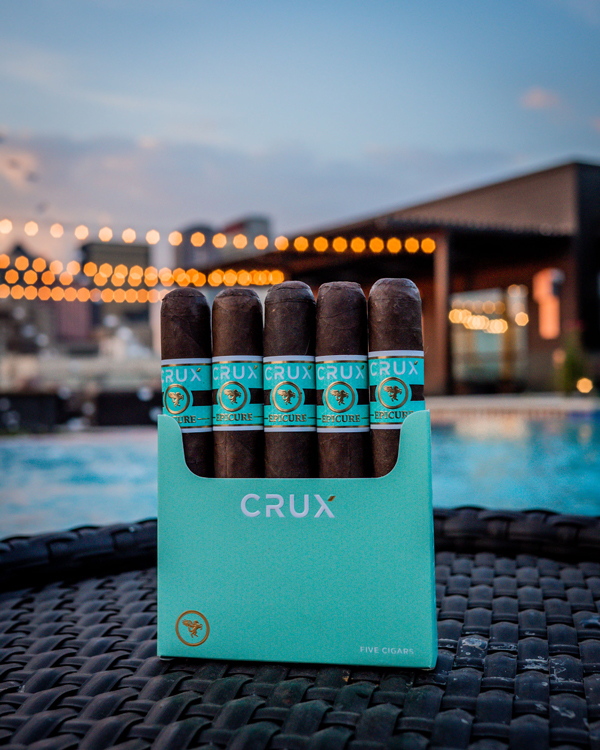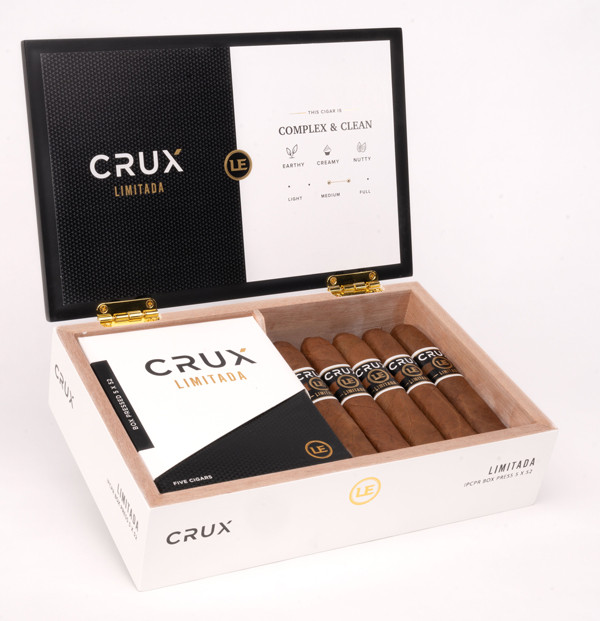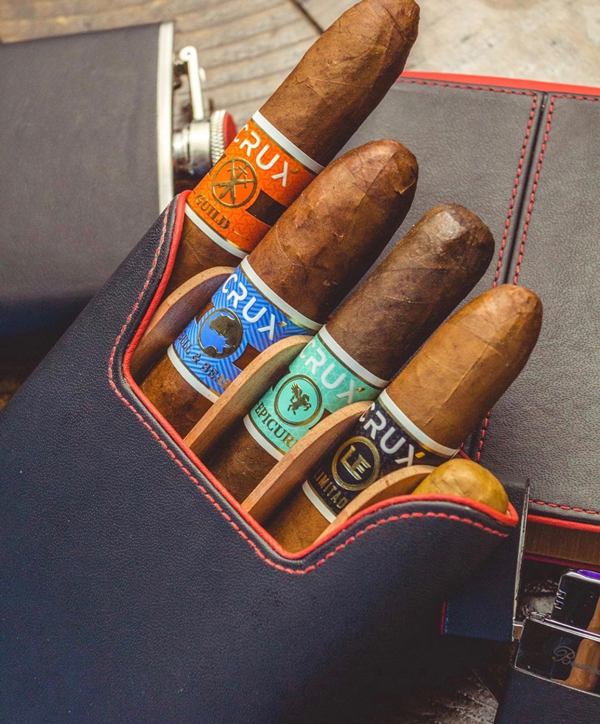“For me, crux is obviously a crucifixion cross,” says Haugen. “In [the] modern day, it can be used as a crossroads. When I think of everything we do and our way of doing business, it is not to take the path of least resistance. Sometimes the easy way of doing it isn’t the best way.”
 Learning from Mistakes
Learning from Mistakes
Finding a manufacturing partner, creating a blend, settling on a name and developing branding are all important steps in getting started in the cigar industry, but they are just that—a start. In the beginning, Crux Cigars didn’t have much of a budget, which made it difficult when it came to marketing and branding the new company. The team also had to decide what sizes to offer in order to appeal to both retailers and consumers. To acquire attention in the industry, Crux Cigars opted to release Ninfamaniac, which was produced in a rare 7 x 33 size that was typically expensive and unique to the U.S. market. Cigars the size of Ninfamaniac were usually released as a limited-edition cigar by other companies, but for Crux, releasing a regular production cigar in this rare size would help the new company build brand awareness. Crux’s Ninfamaniac was offered at an affordable price that caught the attention of retailers and had them asking for more information on Crux Cigars.
As a startup, Crux Cigars didn’t have any sales staff but worked with a handful of brokers around the U.S. The brokers helped, but with Crux being such a new brand, it was often the last product the brokers would push with retailers, requiring Haugen and his team to travel and do their own outreach to retailers. This experience taught Haugen the importance of a brand having a good story behind it.
“Early on, we’d walk into a retail store and say, ‘We’re from Crux.’ They’d look at us and ask, ‘Who?’ and we’d jokingly say, ‘Crux. Wait, you’ve never heard of us?’ They’d go, ‘Well, no ….’ Nobody had heard of us at that point. You really have to tell your story. You have to point out how you’re different as a company—whether it’s how you manufacture or the sizes that you have. Find a point of differentiation.”
Another issue Crux Cigars faced as an undercapitalized company was that it initially opened more retailer accounts than it could handle. Once Haugen and his team got Crux into a retail store, they were soon faced with a number of reorders but not enough inventory to fulfill those orders. After experiencing this problem, the team committed themselves to focusing on increasing production in the factory so that they could meet the demands of their customers. They also learned the value of building up a surplus of inventory so that the company never runs out of product. This has particularly helped the company maneuver around production disruptions brought on by the COVID-19 pandemic.
 Learning from mistakes and remaining nimble has helped Crux Cigars grow since its 2014 debut. Haugen is transparent when it comes to how costly it is to be in the cigar business today. A love for cigars and their ability to bring people together is what motivates and drives Crux Cigars and the team behind it.
Learning from mistakes and remaining nimble has helped Crux Cigars grow since its 2014 debut. Haugen is transparent when it comes to how costly it is to be in the cigar business today. A love for cigars and their ability to bring people together is what motivates and drives Crux Cigars and the team behind it.
“Anybody who starts a business definitely has the goal of making money, and providing for their family,” he says. “Some of us make money, and a lot of us don’t. For a lot of people in the industry, we do this because we love it, we do it because of what cigars mean, and we do it because cigars connect us. As a manufacturer, you get to fly around to stores all around the country and make these connections in different stores. Every time you pass through a store, you’re connected not only to the retailer but those consumers in those brick-and-mortar retail stores, too. I mean, there’s no better job—you’re just going around and selling cigars to your friends all day.”
Connection runs through Crux Cigars. Haugen brought in two family members, Casey and Tony Haugen, to help him manage the company. Another important member of the Crux Cigars team is Sam Ventura, the company’s sales executive, who may not have the Haugen last name but is considered to be part of the family. Working with family and being able to expand the team and make new hires is one of Haugen’s favorite parts of running his own business.
 “I’m very fortunate to work with my family,” he says. “We’re very fortunate to spend time with different retailers and to make these connections with consumers. My life is more blessed than ever, even though there’s been several years of losing money at this. Some companies do this for profits, but I’ve [come to] realize that making money is an easy thing to do. If you make money doing something you love, you should continue to go after it. Go out there and have fun! We’re doing that here at Crux.”
“I’m very fortunate to work with my family,” he says. “We’re very fortunate to spend time with different retailers and to make these connections with consumers. My life is more blessed than ever, even though there’s been several years of losing money at this. Some companies do this for profits, but I’ve [come to] realize that making money is an easy thing to do. If you make money doing something you love, you should continue to go after it. Go out there and have fun! We’re doing that here at Crux.”
Despite the challenges that come with growing a company, Haugen expects that he and Crux Cigars will be part of the cigar industry for decades to come. The only thing that would cause Haugen’s plans to change is if he’s no longer having fun building his brand and business. As he sees Crux Cigars in new retail stores and even in international markets, he’s encouraged and motivated to continue to build Crux Cigars the right way.
“I’ve said this from day one: When there’s no fun in what we’re doing, I’ll do something else. So far, even with all the problems and legislative issues that this industry faces—and I think everybody would agree—this is a fun business to be in.”
This story first appeared in the January/February 2021 issue of Tobacco Business magazine. Members of the tobacco industry are eligible for a complimentary subscription to our magazine. Click here for details.
– Story by Antoine Reid, senior editor and digital director for Tobacco Business Magazine. You can follow him on Instagram @editor.reid.







